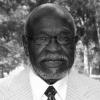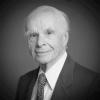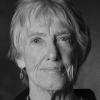The Role of Education
Three pressing problems that need to be addressed regarding the role of education are: 1) Lack of access to quality public education for black Americans at the K-12 level; 2) Inadequate representation of blacks in post-secondary education; 3) Black adults who are functionally illiterate need programs of education to provide literacy.
Louis Gregory
Dr. Pereira was a close friend of Mr. Louis Gregory and had the bounty of his company when he came, many times, as a houseguest to the Pereira household. She tells many anecdotes about the man, named a Hand of the Cause of God upon his death. She relates stories about his experiences with 'Abdu'l-Baha told to her by Mr. Gregory and how the Master gave him the task of joining together the black and white races.
Alain Locke : Dawn Thinker in a Twilight Age
Dr. Alain Locke can possessed intellectual brilliance whereas the beloved Hand of the Cause—Louis Gregory—possessed spiritual brilliance.
Locke’s life was a demonstration of the high academic standards a Baha'i could achive. ‘Adu'l-Baha has written: “I desire distinction for you; I desire that the Baha'is contribute to the useful arts of civilization.” Also He emphasized the importance of science and all things related to it. Dr. Locke earned a doctrorate in Philosophy from Harvard and won a prestigious Rhodes Scholarship to do postgraduate work at Oxford.
Strategies in Social Change
What I propose to do is provide a framework in which to think about development strategies and the ways in which they may or may not fit an existing society.
One of the main themes addressed in this session is that social change is not confined to individuals but should be viewed in light of the society or nation as a whole. Our dreams of an ideal of a "heaven on Earth:, sometimes called of the “Holy City” or the “New Jerusalem” is what we strive for.
FUNDAEC: Case Study in an Alternative for Rural Development
“FUNDAEC, the acronym in Spanish for “The Foundation for the Application and Teaching of the Sciences”, is a non-profit non-governmental organization that focuses on training and development in the rural areas of Colombia and other countries in Latin America. It was created in 1974 in Colombia by a group of scientists and professionals led by Farzam Arbab, ... who had arrived as a visiting professor to the University of Valle in 1970.” A unique aspect of this program was to use consulation to develop the goals and objectives and to integrate them with service to the community.
The Coming Transformation of Global Society
“In recent decades the world has entered a phase of evolution from an industrial society to an information society interconnected at the global level. The challenges that these changes require to the humankind are enormous and we are not yet ready to face them. There is no alternative: either we work to create a peaceful and cooperative global society, or we will put in danger the human stability on Earth.”
Integrating Personal & Social Change
The integration of personal and social change is a process. The two are inseparable and go hand-in-hand together. Change is imutable. It is either growth or decay. The paradigms of how we think about the work is shifting.
Dr. Danesh reviews the sources of social and cultural change viewed through the lenses of Marx and Hegal. All civilizations pass through the phases of birth, growth, breakdown and disintegration. The process of development is a methodical one. It is intellectual and spiritual at the same time. To make progress we must understand where we are going.
Unity The Ultimate Paradigm Shift
Sheila Banai asserts that her entire talk can be summed up by this quotation of Shoghi Effendi's: "Let there be no mistake. The principle of the Oneness of Mankind—the pivot round which all the teachings of Bahá’u’lláh revolve—is no mere outburst of ignorant emotionalism or an expression of vague and pious hope. Its appeal is not to be merely identified with a reawakening of the spirit of brotherhood and good-will among men, nor does it aim solely at the fostering of harmonious cöoperation among individual peoples and nations.
Victory over Violence
In Iran, the Baha’is, even at the price of their lives, contribute to the establishment of unity. Baha’i villages in Iran are teaching equality, monogamy, universal education; and this produces a profound transformation in the life of society. To overcome violence society needs a different set of values—Baha’i values—that will ultimately produce “victory over violence”.
On the Future of Penal Law
Dr. Udo Schaefer explains that the breakdown of the old world order and the instigation of a new one carries with it the concomitant responsibility to revise existing penal laws. He reviews the various theories of crime and punishment from antiquity. He also covers Catholic and Protestant approaches to this subject.
Dr. Schaefer closes with the “implications of Baha’u’llah’s revelation” as it impacts penal law. Baha’is must view the penal conditions of the Kitab-i-Aqdas in the context of future society.
Disarmament and the Baha’i Faith
“In the principles of the Baha’i Faith there is an agenda for new thinking.” The “us” vs. “them” thinking is broken down by the Baha’i concept of progressive revelation and the oneness of humanity. Each Baha’i principle links to peace when studied closely. What human being can initiate war when he understands that that person in the other country is truly his brother or sister?
Leaders around the world are coming to the realization of the need for a new political order. It is the Bahá’í Faith that is the true “grass roots movement” towards disarmament and peace.
Religion or Foreign Intrigue
In the spring of 1982 the Universal House of Justice wrote to a number Baha’i Academics inviting them to prepare a response to the charges made by representatives of Iran’s Islamic Republic against the Baha’i Faith. Douglas Martin and Dr. Firuz Kazemzadeh were two others invited to respond, in addition to Dr. Banani, who are in attendance at this conference, were also invited to respond.
Panel Discussion, Part 1:
Questions from the audience to panel members occupies the time of this discussion. A summary sample: 'If the Baha'is Faith says were are in the springtime of peace, what is the evidence?'
On the role of children. The Master said children should deliver eloquent speeches of high quality, which was reinforced by the Guardian's statements on this point. What is being done about this?
Panel Discussion, Part 2:
Each of the four panelists gives a brief presentation about what this conference has meant to him or her. Some address specific questions they have been working on in their own professions. For example, Dr. Macy is preoccupied with “change” in the process of “transformation”. Dr. Lazlo marvels that Bahá’u’lláh accurately addressed many of these issues covered in this conference more than 100 years earlier.
The Role of Youth in Peace
Helen and John Danesh shared this presentation. Helen spoke the first half, followed by John.
The youth point out that out of the past 5,000 years there has been only a paltry 240 years spent in peace. Martha Root said that, even in her time, youth were ready to embrace the ideals of peace and work for their realization.
General Principles for a Crime Free Society
Mr. McMurray—a former police officer—and one who served on a United Nations Committee on Crime Prevention and Control—offers a Baha’i perspective on a crime-free society. Expresses the need for broader participation by the community and especially by people who lack academic credentials in consulting about approaches to crime prevention.
Structure of Power in the Baha’i Administrative Order
Mr. Gagnon’s thesis is: “Contrary to other forms of social organization, the Bahá’í Faith contains strictures to prevent the struggle for power within and between” Bahá’í institutions. He goes on to review the nature of “power” and how it is wielded within the Bahá’í administrative structure. In secular political organizations individuals often wield an unusual degree of personal power. In Bahá’í administrative institutions power is vested solely in the institutions. He contrasts the nature of secular political elections with that of the Bahá’í electoral process.
Worldviews and the Shape of Baha’i Communities
This is a synopsis of the presentation by Dr. Van den Hoonard. Due to time constraints for that evening's presentations scheduling, he reads from his paper's abstract:
The Institutions of Government & Politics and the Baha’i Faith
Institutions are structures that develop to organize important activities in ways that uphold cultural values. Education, family, religion, politics, and economics are some of those institutions. “They form the structure of society.”
The Guardian, Shoghi Effendi, referred to the Bahá’í government as the Bahá’í commonwealth. Bahá’í institutions will eventually provide the structure for the future order of the world. “The powers released by Baha’u’llah meet the needs of the time.”
The Institutions of Government & Politics and the Baha’i Faith: Panel Discussion
Richard Gagnon begins by offering the audience a chance to ask questions. The first one (is inaudible) and directed to Dr. Will van den Hoonard. The issue is holding competing world views within the Bahá'í community. Some see the Bahá’í and non-Bahá’í world as one: the ‘Old World Order’ with the ‘New World Order’ if you will; others see the Bahá’í view as unique and in sharp contrast to the non-Bahá’í world. For example, “Many are called but few are chosen.” The point is to show that all are not equal. For each perspective there is a counterpoint.
Prof. August Forel in Defense of the Persecuted Persian Baha’is in 1925-1927
This paper is part of a doctoral thesis John Paul Vader wrote in 1981 for the University of Lausanne, Switzerland. It is being read by May Hofman Ballerio. It was quite unusual for someone earning a medical degree at a French university to write about the persecutions of the Baha’is of Iran from the perspective of one of its most celebrated Swiss scientists, Dr. August Forel (1848-1931). Dr. Forel was honored with one of ‘Abdu’l-Baha’s weightiest Tablets. In the 1920s there was a wave of persecutions against the Baha’is. Dr.
Illuminator vs. Redeemer - A trajectory of Ebionite Christology from Prophet Messianism to Baha’i Theophanology
Christopher Buck opens his talk by mentioning that “we dwell in a predominantly christian culture so relating the Baha’i Faith to our Christian Heritage is important to him.” He attempts to use a scientific approach to the oneness of religion in establishing his philosophical basis, what he calls, “A History of Religions in a Nutshell.” Christopher attempts to string together the unity of religion through examples within both the torah, bible, and quran, with specific references to actual historical facts that we are currently aware of in regards to specific cultures and societies of the ti
Images of a New Age in the 20th Century
Dr. Badi feels that most of the papers presented at this conference have to do with the building up or tearing down of the present order.
The Role of Intuition in the Knowledge of God
Jack quotes the Bab, “Knowledge is a single point, which the ignorant have multiplied.” The oneness and unity of thought, religious and science is very much the true reality. Abdul-Baha prophesized that one-day Canada and the United States would be one country, and that it would be called Columbia. The topic of today’s presentation is, “The role of Intuition in the knowledge of God”.
The Baha'i Faith and the 20th Century
Brian Aull speaks about religion and the scientific method. His approach is: “religion as scientific” and “science as a spiritual tool”. He quotes from Baha’u’llah’s “Tablet of Wisdom” (Lawh-i-hikmat). He suggests that at its base, science is in a quest for the most fundamental constituents that comprise matter.
The Baha'i Faith and the 20th Century
Ms. Sabri won an award for scholarship from the ABS. Her topic for this talk is “The Purpose of Poetry”. She begins by quoting “The Secret of Divine Civilization” where ‘Abdu’l-Baha said, “The individual should, prior to engaging in the study of any subject, ask himself what its uses are and what fruit and result will derive from it. If it is a useful branch of knowledge, that is, if society will gain important benefits from it, then he should certainly pursue it with all his heart.” The Guardian has said there is no cultural expression at this time that can be called “Baha’i”.


























